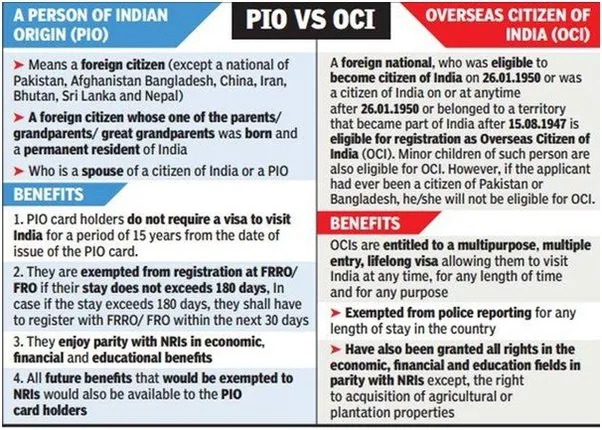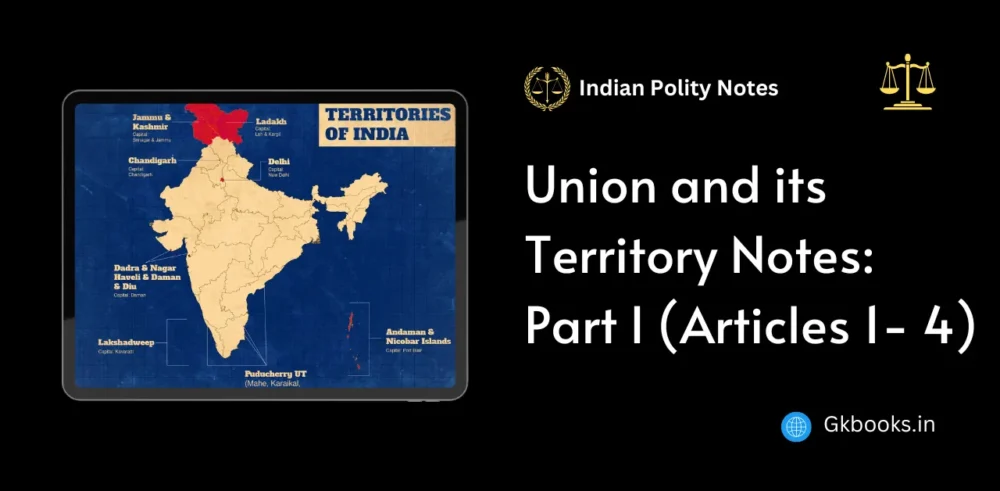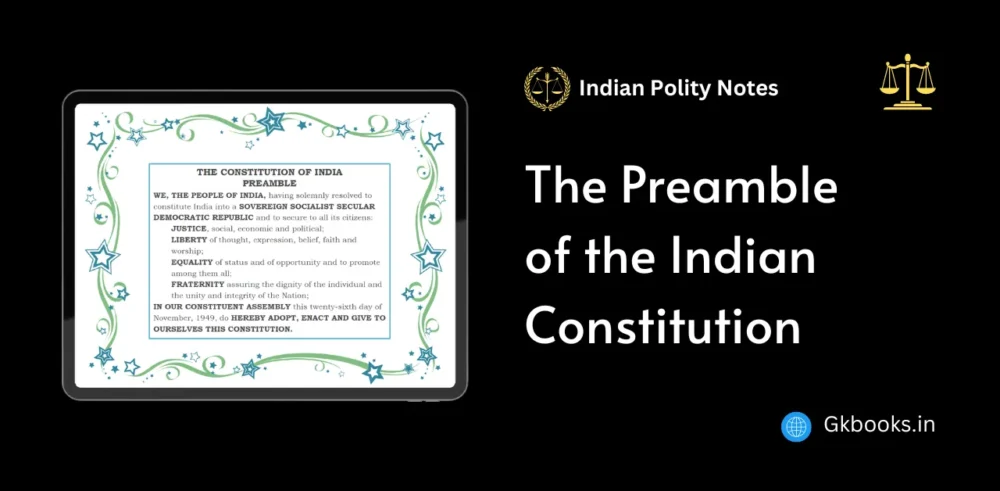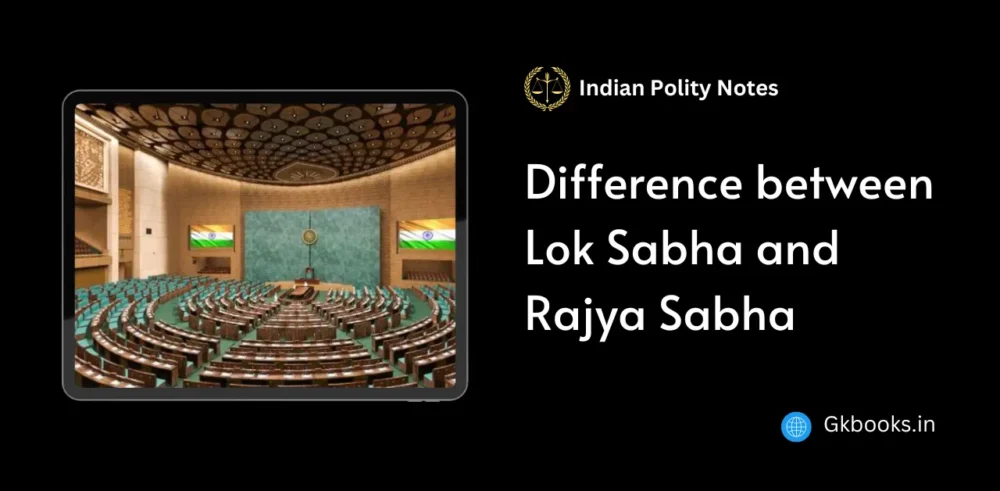Part II of the Constitution of India (Articles 5-11) deals with the Citizenship of India. Here, you can learn about the laws, acts, ways, and articles of the Constitution related to the Citizenship of India, along with video info bits.
Changes in citizenship laws and policies have led to discussions about their effects on different parts of society and how they align with constitutional principles. Understanding these topics is important for competitive exams like SSC, WBCS, CDS, and other state-level exams.

Citizenship of India
Citizenship in India is a legal status that grants individuals certain rights and privileges within the country. The Citizenship Act of 1955 regulates matters related to Indian citizenship. The act outlines various ways through which a person can acquire or lose Indian citizenship.
There are three main methods through which individuals can acquire Indian citizenship:
By Birth
- Individuals born in India on or after January 26, 1950, are considered citizens of India by birth.
- Those born in India between January 26, 1950, and July 1, 1987, are regarded as citizens regardless of their parents’ nationality.
- Individuals born in India on or after July 1, 1987, but before the commencement of the Citizenship (Amendment) Act, 2003, are considered citizens if at least one parent is a citizen of India at the time of their birth.
✅ Read More: The Preamble of the Indian Constitution: Full Explanation
By Descent
- Individuals born outside India on or after January 26, 1950, but before December 10, 1992, are considered citizens if their father is a citizen of India at the time of their birth.
- Individuals born outside India on or after December 10, 1992, are considered citizens if either parent is a citizen of India at the time of their birth.
By Registration
- Individuals who are not citizens by birth or descent can acquire Indian citizenship through registration under certain conditions. This includes people who have been residing in India for several years or are married to Indian citizens.
The Citizenship (Amendment) Act of 2003 introduced provisions for Overseas Citizens of India (OCI) and Persons of Indian Origin (PIO), allowing certain categories of foreign nationals of Indian origin to have specific privileges and rights in India without full citizenship.
It’s important to note that acquiring Indian citizenship can also lead to the loss of citizenship in some cases. For example, a person who voluntarily acquires the citizenship of another country may lose their Indian citizenship. Additionally, the government of India has the authority to cancel or revoke citizenship under specific circumstances.
✅ Read More: Union and its Territory Notes: Part I (Articles 1- 4)
Citizenship: Part II of the Constitution
Part II of the Constitution of India (Articles 5-11) deals with the Citizenship of India.
Article 5 talks about the citizenship of India at the commencement of the Constitution (November 26, 1949).
Article 11 gave powers to the Parliament of India to regulate the right of citizenship by law. This led to the creation of the Citizenship Act 1955 by the Indian Parliament.
Article 5: Citizenship at the Commencement of the Constitution
At the commencement of this Constitution, every person who has his home in the territory of India and –
(a) was born in the territory of India; or
(b) either of whose parents were born in the territory of India; or
(c) has been ordinarily resident in the territory of India for not less than five years immediately before such commencement, and shall be a citizen of India.
Article 6: Rights of Citizenship of Certain Persons Who Have Migrated to India from Pakistan
Despite anything in Article 5, a person who has migrated to the territory of India from the territory now included in Pakistan shall be considered a citizen of India at the commencement of this Constitution if –
(a) he or either of his parents or any of his grandparents was born in India as defined in the Government of India Act, 1935 (as originally enacted); and
(b) (i) In the case where such a person has migrated before July 19, 1948, he has been ordinarily resident in the territory of India since the date of his migration, or
(ii) in the case where such a person has migrated on or after July 19, 1948, he has been registered as a citizen of India by an officer appointed by the Government of the Dominion of India on an application made by him to such officer before the commencement of this Constitution in the form and manner prescribed by that Government:
Provided that no person shall be so registered unless he has been resident in the territory of India for at least six months immediately before the date of his application.
✅ Read More: Difference between Lok Sabha and Rajya Sabha: Complete Details
Article 7: Rights of Citizenship of Certain Migrants to Pakistan
Despite anything in Articles 5 and 6, a person who has, after March 1, 1947, migrated from the territory of India to the territory now included in Pakistan shall not be considered a citizen of India:
Provided that nothing in this article shall apply to a person who, after migrating to the territory now included in Pakistan, has returned to the territory of India under a permit for resettlement or permanent return issued by or under the authority of any law and every such person shall, for the purposes of clause (b) of Article 6, be considered to have migrated to the territory of India after July 19, 1948.
Article 8: Rights of Citizenship of Certain Persons of Indian Origin Residing Outside India
Despite anything in Article 5, any person who or either of whose parents or any of whose grandparents was born in India as defined in the Government of India Act, 1935 (as originally enacted), and who is ordinarily residing in any country outside India as so defined shall be considered a citizen of India if he has been registered as a citizen of India by the diplomatic or consular representative of India in the country where he is residing on an application made by him to such diplomatic or consular representative, whether before or after the commencement of this Constitution, in the form and manner prescribed by the Government of the Dominion of India or the Government of India.
Article 9: Persons Voluntarily Acquiring Citizenship of a Foreign State Not to Be Citizens
No person shall be a citizen of India by Article 5 or be considered a citizen of India by Article 6 or Article 8 if he has voluntarily acquired the citizenship of any foreign State.
Article 10: Continuance of the Rights of Citizenship
Every person who is or is considered to be a citizen of India under any of the previous provisions of this Part shall, subject to the provisions of any law that may be made by Parliament, continue to be such a citizen.
Article 11: Parliament to Regulate the Right of Citizenship by Law
Nothing in the previous provisions of this Part shall take away from the power of Parliament to make any provision concerning the acquisition and termination of citizenship and all other matters relating to citizenship.
Citizenship of India Key Facts
Citizenship Laws in India
The conferment of citizenship in India is governed by Articles 5 to 11 (Part II) of the Indian Constitution.
In addition to these constitutional provisions, citizenship is closely linked with the Citizenship Act, which was passed by the Indian Parliament in 1955.
The Citizenship Act 1955 addresses citizenship in India following the commencement of the Constitution. It provides guidelines for acquiring and terminating Indian citizenship.
Legislation pertaining to this matter includes the Citizenship Act of 1955, amended by the Citizenship (Amendment) Acts of 1986, 1992, 2003, 2005, and 2019.
Acquisition of Indian Citizenship as per Citizenship Act 1955:
Indian citizenship can be acquired through:
- Citizenship at the commencement of the Indian Constitution.
- Citizenship by birth, with different clauses for various periods.
- Citizenship by descent.
- Citizenship by registration.
- Citizenship by naturalization.
Termination of Indian Citizenship as per Citizenship Act 1955:
Indian citizenship can be lost through renunciation, termination, or deprivation.
Persons domiciled in India on November 26, 1949, automatically became Indian citizens when the relevant provisions of the Indian Constitution came into effect (Citizenship at the commencement of the Indian Constitution).
Anyone born in India between January 26, 1950, and July 1, 1987, is a citizen of India by birth (Citizenship by birth).
A person born in India on or after July 1, 1987, is a citizen of India if at least one parent was a citizen of India at the time of the birth (Citizenship by birth).
Those born in India on or after December 3, 2004, are considered citizens only if both parents are Indian citizens or if one parent is an Indian citizen and the other is not an illegal migrant at the time of birth (Citizenship by birth).
Indian nationality law primarily follows jus sanguinis (citizenship by right of blood) rather than jus soli (citizenship by right of birth within the territory).
Article 9 of the Indian Constitution states that a person who voluntarily acquires citizenship of another country ceases to be an Indian citizen. Additionally, under The Passports Act, failing to surrender an Indian passport after acquiring another country’s citizenship is punishable.
Persons of Indian Origin (PIO) Card:
A PIO card applicant must be a person of Indian origin who is a citizen of any country except Pakistan, Bangladesh, Sri Lanka, Bhutan, Afghanistan, China, and Nepal. They may also be a former Indian passport holder or the spouse of an Indian citizen or person of Indian origin.
Overseas Citizen of India (OCI) Card:
The OCI card is for foreign nationals eligible for Indian citizenship on January 26, 1950, or who became citizens on or after that date. Applications from citizens of Bangladesh and Pakistan are not accepted.

Overseas Indian Card:
The proposed legislation, The Citizenship (Amendment) Bill, aims to replace the OCI and PIO cards with a new Overseas Indian Card.
PIO cardholders enjoy multiple entry privileges for 15 years without a separate visa, while OCI cardholders have a lifelong visa. OCI cardholders have economic, financial, and educational parity with non-resident Indians, except in acquiring agricultural land. PIO cardholders must register with local police if staying in India for more than 180 days on a single visit.
OCI is not dual citizenship and does not confer voting rights.
The President of India holds the title of the first Citizen of India.
Related Article:



